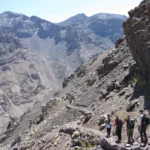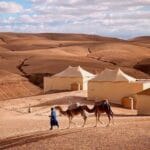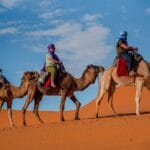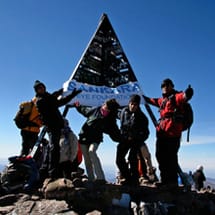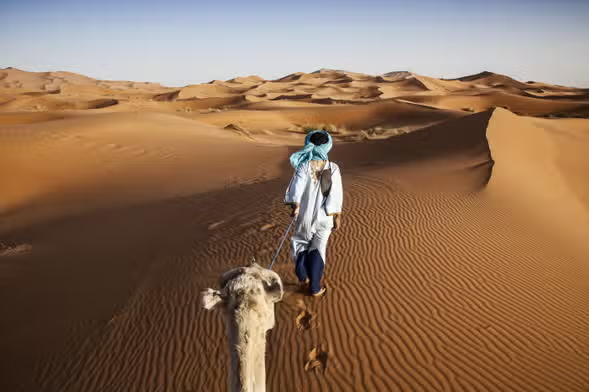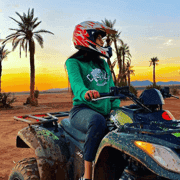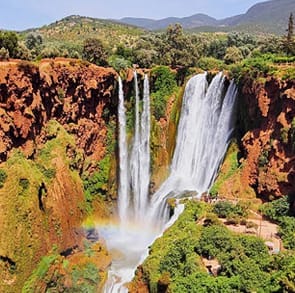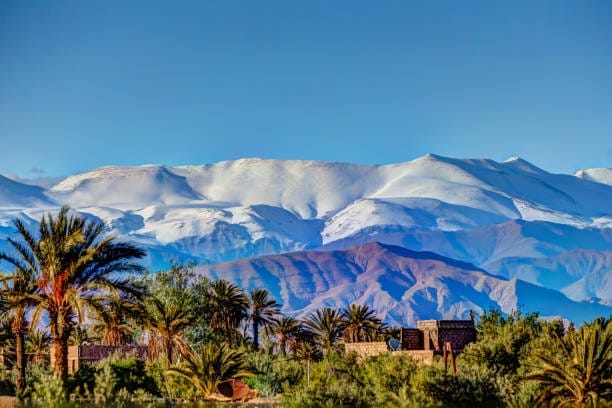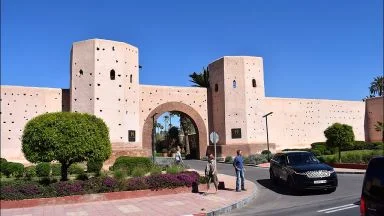
Overview of Ascension Toubkal Trek
Table of Contents
You’re about to embark on one of the most thrilling adventures of your life! The Toubkal Trek takes you to the highest peak in the Atlas Mountains, standing proudly at 4,167 meters. The trek challenges adventure-seekers, offering breathtaking views, rugged landscapes, and a satisfying sense of achievement. Whether you’re an experienced hiker or a novice, this trek has something for everyone.
Importance of Ascending Mount Toubkal
So, why is ascending Mount Toubkal so significant? Here are a few compelling reasons:
- Breathtaking Views : Experience panoramic landscapes that showcase the beauty of Morocco.
- Cultural Immersion : Encounter local Berber tribes and learn about their traditions.
- Personal Achievement : Conquering Toubkal boosts your confidence and gives you a unique story to tell!
Let’s dive deeper into the planning and preparation for this extraordinary journey ahead!

Planning Your Trek
Best Time to Visit
Timing your ascent of Mount Toubkal can make all the difference! The ideal seasons are spring (April to June) and autumn (September to October). During these months, the weather is mild, and the trails are less crowded. This was my experience when I trekked in late September—the vibrant fall colors and clear skies were simply unforgettable!
Essential Gear Required
Packing the right gear is crucial for a successful trek. Don’t worry, we’ve got you covered! Here’s a list of essentials:
- Footwear : Sturdy hiking boots for traction and support.
- Clothing : Layered attire to manage temperature changes; think moisture-wicking base layers, insulated jackets, and breathable pants!
- Backpack : A comfortable daypack for water and snacks.
- Other Gear : Trekking poles, a good-quality sleeping bag, and navigation tools.
Be prepared, and your experience will be all the more enjoyable! Now, let’s talk about how to get to Toubkal.
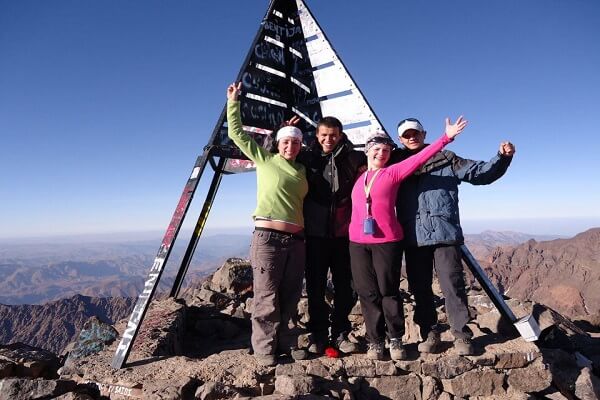
Getting to Toubkal
Transportation Options
Once you’re ready to tackle the Toubkal Trek, getting there is your next adventure! Most trekkers start from Imlil, a charming village situated about 65 kilometers from Marrakech. Here are your best transportation options:
- Shared Taxis : A cost-effective and local experience! Just hop into a shared taxi from Marrakech; it’s an easy ride.
- Private Transfers : If comfort is your priority, arranging a private transfer is a great idea. It’s quicker and can be more flexible.
I loved taking a shared taxi—it added to the excitement of meeting fellow trekkers!
Accommodation Choices
Accommodations in Imlil cater to a range of preferences, whether you’re a backpacker or looking for a cozy guesthouse. Here’s what you can expect:
- Hostels and Guesthouses : Affordable and social; an excellent way to meet fellow adventurers.
- Hotels : For a bit more comfort, consider a local hotel that offers stunning mountain views.
- Camping : For the truly adventurous, some opt to camp along the trek to immerse themselves in nature fully.
Choosing the right place to stay sets the tone for your upcoming adventure! Next, let’s explore the trekking routes that will lead you to the summit of Toubkal.

Trekking Routes
Popular Trails to the Summit
Once you’re geared up and ready to hit the trails, let’s talk about the routes that lead to the summit of Mount Toubkal! The most popular is the Imlil to Toubkal Route, which spans about 19 kilometers. This trail is well-marked, making it accessible for most trekkers. Here are some highlights:
- Challenging Ascent : The final stretch is steep but rewarding.
- Stunning Views : As you climb, you’ll be greeted by breathtaking scenery, including panoramic vistas of the Atlas Mountains.
During my trek, reaching the summit felt like a triumphant moment, shared with fellow hikers celebrating together!
Alternative Scenic Routes
If you’re looking to explore off the beaten path, consider these scenic alternatives:
- Mizane Valley Trail : This less-frequented route offers serene natural beauty and fewer crowds.
- Aremd and the Southern Cwm : A gorgeous detour that takes you to more remote villages, giving you a taste of local culture along the way.
Taking these alternative routes adds a unique flair to your Toubkal experience! With your chosen path in mind, let’s discuss how to acclimatize properly to the altitude.

Acclimatization Tips
Understanding Altitude Sickness
As you prepare to conquer the heights of Mount Toubkal, it’s essential to understand altitude sickness. This condition can affect anyone, regardless of fitness level, as you ascend to high altitudes quickly. Common symptoms include:
- Headaches
- Nausea
- Fatigue
- Dizziness
During my trek, I saw several trekkers pause to catch their breath and hydrate. Taking it slow is key!
Preparing Your Body for High Altitudes
Before you set foot on the trails, consider these acclimatization tips to prepare your body:
- Arrive Early : Spend a day or two in Imlil to allow your body to adjust.
- Stay Hydrated : Drink plenty of water; staying hydrated is crucial for combating altitude sickness.
- Avoid Alcohol : Limit alcohol intake during your trek, as it can dehydrate you.
By following these steps, you’ll give yourself the best chance to enjoy your ascent to the summit of Toubkal! Now, let’s discuss some essential safety guidelines to ensure a secure trekking experience.
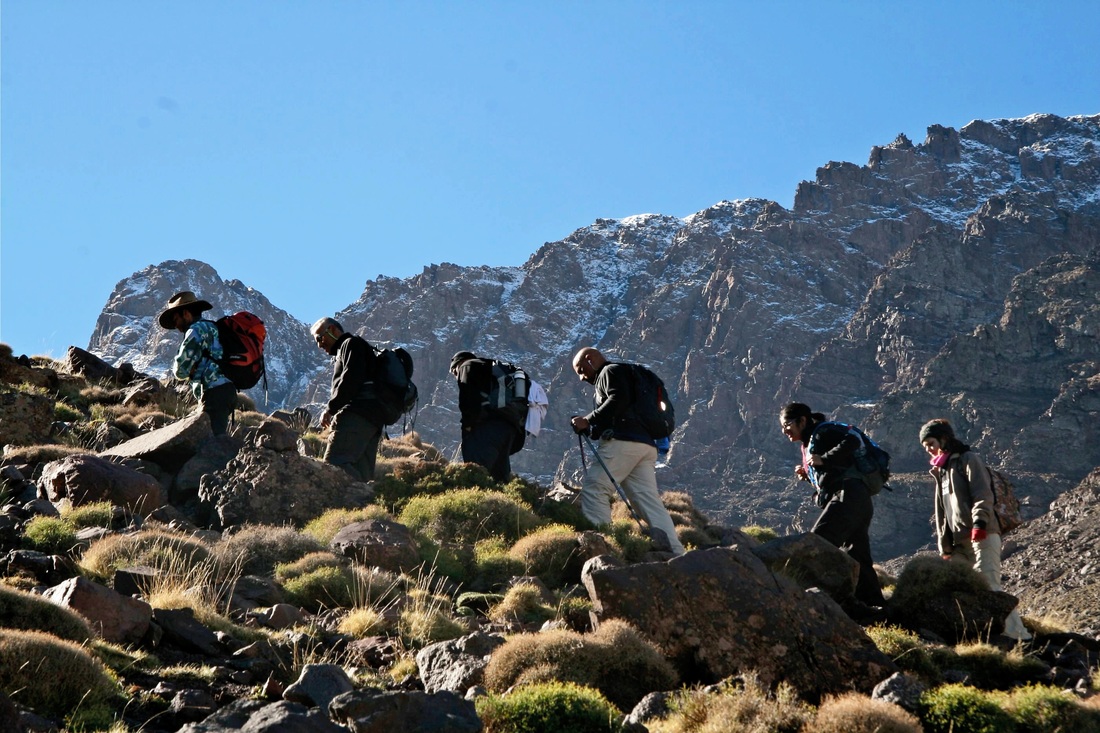
Safety Guidelines
Weather Considerations
When trekking Mount Toubkal, the weather can change in an instant. Understanding the forecast is crucial for a safe experience. Typical conditions include:
- Spring : Mild temperatures but potential for snow.
- Summer : Warm days with cooler nights, a great time to hike.
- Autumn : Beautiful colors but watch for sudden cold fronts.
- Winter : Challenging conditions with heavy snowfall—best for experienced trekkers only.
During my trip, I was caught in a brief snowstorm—thankfully, we were prepared and safely sheltered!
Emergency Contact Information
Having emergency contact information on hand is vital. Here’s what you need:
- Local Guides : Always trek with a local guide who knows the trails and weather patterns.
- Emergency Numbers : Store important numbers in your phone, including your guide and local rescue services.
- Group Stay Together : Never wander off; keeping the group intact ensures safety in numbers!
With these guidelines, you’ll be well-prepared for a secure and enjoyable trek. Next, let’s explore the fascinating flora and fauna you’ll encounter on your journey!

Flora and Fauna
Biodiversity of Toubkal National Park
As you trek through Toubkal National Park, you’ll be immersed in a stunning array of biodiversity. The park is home to over 1,500 plant species, including unique endemic flora. Some highlights include:
- Almond Trees : Their beautiful blossoms are a delight in spring.
- Wildflowers : Varieties like the vibrant poppy and various orchids create a picturesque landscape.
During my hike, I marveled at the sheer variety of colors and scents in the fragrant air!
Wildlife Spotting Opportunities
The wildlife in Toubkal National Park is just as captivating. Keep your eyes peeled for:
- Barbary Macaques : These playful monkeys are often seen foraging near trails.
- Eagles and Vultures : Birdwatching enthusiasts will appreciate spotting these majestic raptors.
Each encounter with nature adds to the adventure, making your trek all the more unforgettable! Now, let’s dive into the rich cultural encounters you’ll experience in the Atlas Mountains.

Cultural Encounters
Berber Tribes in the Atlas Mountains
As you ascend Mount Toubkal, you’re not only trekking through breathtaking landscapes but also stepping into the rich culture of the Berber tribes. These indigenous people have inhabited the Atlas Mountains for centuries. Some highlights of their culture include:
- Traditional Dress : Colorful garments adorned with intricate patterns.
- Handicrafts : Unique rugs and pottery that showcase their artistry and craftsmanship.
During my trek, I was fortunate enough to witness a traditional Berber celebration—an experience I’ll cherish forever!
Interaction with Local Communities
Engaging with local communities along the way offers invaluable insights into their way of life. Opportunities to connect include:
- Homestays : Stay with a Berber family for an authentic experience and delicious homemade meals.
- Guided Tours : Local guides often share fascinating stories about their history and customs.
These interactions not only enrich your journey but also foster a deeper appreciation for the culture surrounding you. Next, let’s talk about what to expect on your summit day experience!

Summit Day Experience
Sunrise Views from the Top
Summit day is the moment you’ve been preparing for, and it starts early! You’ll rise before dawn to make your ascent in the cool morning air. The experience is nothing short of magical. As you near the top, the horizon begins to glow with brilliant hues of orange and pink. The sunrise over the Atlas Mountains is an unforgettable sight!
- Photography : Don’t forget your camera—the views are postcard-perfect!
- Quiet Reflection : Take a moment to appreciate how far you’ve come.
Celebrating Your Achievement
Reaching the summit of Toubkal is a collective achievement, and the sense of camaraderie among trekkers is palpable. As you stand at the 4,167-meter peak, here’s how to celebrate:
- Group Photos : Capture the moment with your trekking buddies.
- Enjoy Snacks : Share some food and cheers while soaking in the stunning view.
- Personal Reflection : Take a moment to savor the accomplishment, and maybe jot down thoughts in your journal.
Completing the trek is not just about the physical challenge; it’s an enriching life experience that you’ll treasure forever. Next, let’s look at some vital post-trek recovery tips to keep you feeling great!

Health and Wellness
Post-Trek Recovery Tips
After conquering Mount Toubkal, it’s essential to focus on recovery. Your body will appreciate these simple tips ensuring you bounce back stronger:
- Hydrate : Drink plenty of water to rehydrate after your trek.
- Stretch : Gentle stretching helps relieve muscle tension and soreness.
- Nutritious Meals : Nourishing your body with balanced meals rich in protein and carbohydrates will aid recovery.
I remember treating myself to a hearty Moroccan tagine post-trek—it was a satisfying reward!
Fitness Preparation for Toubkal Trek
Preparing for the ascent starts long before your journey! Here’s how to get your body ready:
- Cardiovascular Training : Engage in activities like hiking, running, or cycling to build stamina.
- Strength Training : Focus on leg workouts (squats and lunges) and core strength to handle the trek’s demands.
- Practice Hiking : Try local trails with inclines to mimic the elevation of Toubkal.
Remember, consistency is key! With the right prep, you’ll be set for an incredible adventure. Let’s explore some sustainable tourism practices to help protect this stunning destination.
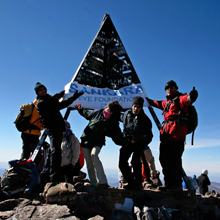
Sustainable Tourism Practices
Leave No Trace Principles
As responsible trekkers, practicing sustainable tourism is vital for preserving the beauty of Mount Toubkal. Following the Leave No Trace Principles will help ensure the environment remains pristine for future visitors. Key practices include:
- Pack Out Trash : Carry all waste back with you—nothing should be left behind!
- Stay on Trails : Protect vegetation by sticking to established paths.
- Respect Wildlife : Observe animals from a distance and avoid feeding them.
On my trek, I saw teams adhering to these principles, which made me appreciate the shared commitment to our planet.
Supporting Local Conservation Efforts
Another way to make a positive impact is by supporting local conservation initiatives. Here’s how you can contribute:
- Choose Eco-Friendly Tours : Opt for tour operators committed to sustainable practices.
- Participate in Local Programs : Engage in community clean-ups or conservation workshops during your stay.
- Shop Responsibly : Purchase handcrafted goods from local artisans to ensure that your money supports the community.
By integrating these sustainable practices into your adventure, you’ll help protect the natural beauty of the region for generations to come. Ready to embark on your Toubkal Trek? With proper preparation and respect for the environment, an unforgettable journey awaits you!


